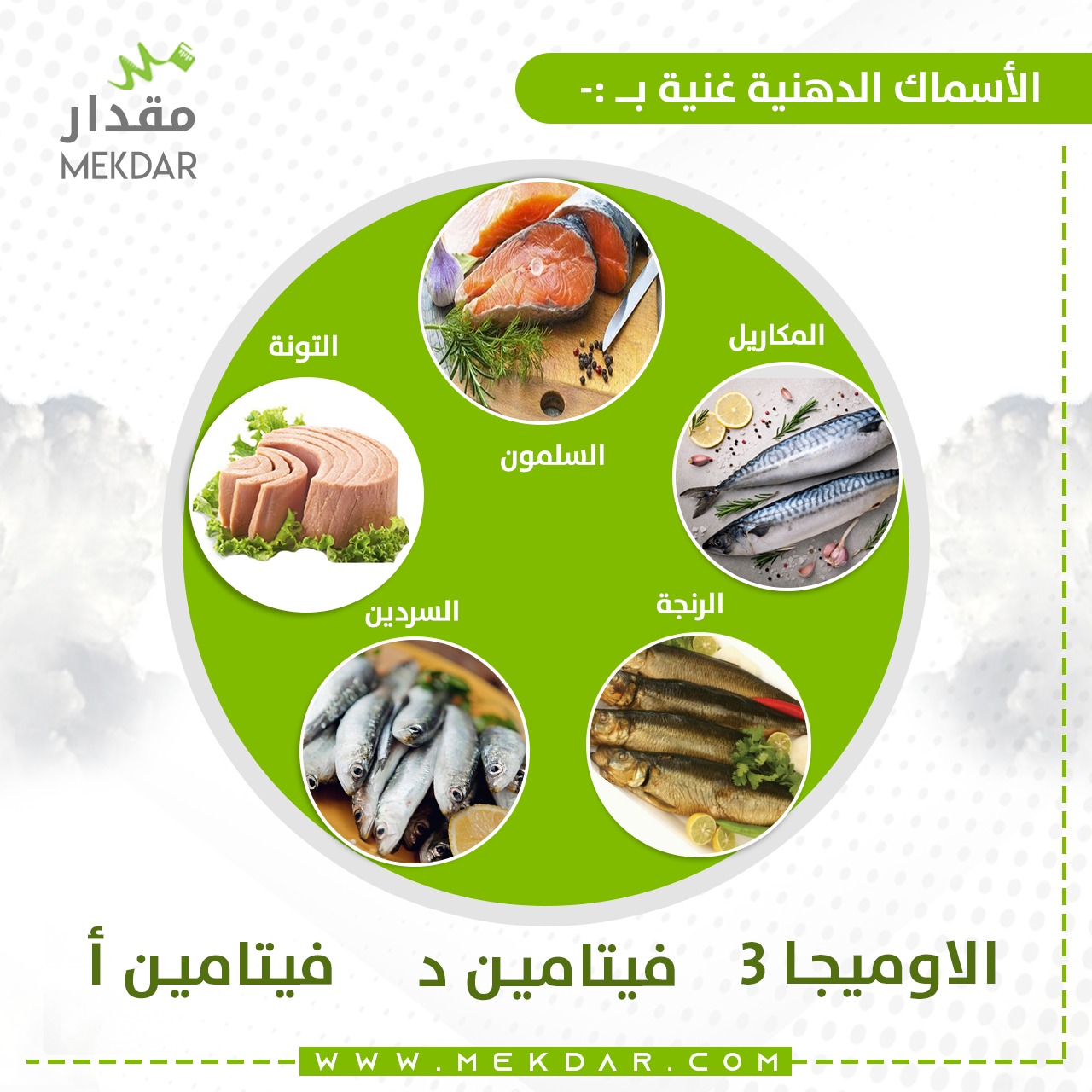د. وليد فؤاد
تحليل القيمة الغذائية للأسماك الدهنية ... مع مقدار
Analysis of the Nutritional Value of Fatty Fish overview by Mekdar.com
Analysis of the Nutritional Value of Fatty Fish - تحليل القيمة الغذائية للأسماك الدهنية
تعرف على فوائد دمج الأسماك الدهنية في نظامك الغذائي من خلال تحليلنا الشامل لقيمتها الغذائية.
تعتبر الأسماك الدهنية مصدرًا غنيًا بالعناصر الغذائية التي تقدم العديد من الفوائد الصحية. في السنوات الأخيرة ، كان هناك اهتمام متزايد بالقيمة الغذائية لهذه الأنواع من الأسماك بسبب محتواها العالي من أحماض أوميجا ٣ الدهنية ، والتي تم ربطها بتقليل مخاطر الإصابة بأمراض القلب والأوعية الدموية ، وتحسين وظائف المخ ، وتقليل الالتهابات. في هذه المقالة ، سنقدم تحليلاً شاملاً للقيمة الغذائية للأسماك الدهنية ، بالإضافة إلى نصائح حول أفضل المصادر وطرق طهيها لتعظيم فوائدها الصحية.

ربطت الكثير من الأبحاث بين الأسماك الدهنية والعديد من الفوائد الصحية ، منها انخفاض مخاطر الإصابة بأمراض القلب ، وتحسن القدرات العقلية ، والحماية من السرطان ، والخرف ( النسيان) ، والتهاب المفاصل الروماتويدي بسبب محتواها العالي من الأوميجا ٣
تعتبر الأسماك الدهنية أيضًا مصدرًا جيدًا لفيتامين (أ) الضروري لصحة الجلد والبصر والمناعة الجيدة
هناك الكثير من فيتامين (د) في الأسماك الدهنية وهذا يعني عظام قوية ومناعة جيدة
تقترح جمعية القلب الأمريكية استهلاك حصتين على الأقل من الأسماك ، وخاصة الأسماك الدهنية ، كل أسبوع
ومع ذلك ، فإن العديد من الأسماك تحتوي على مستويات عالية من الزئبق بسبب التلوث الصناعي
لحسن الحظ هناك العديد من الأسماك الدهنية التي تحتوي على نسبة عالية من أوميجا ٣ ولكنها أيضًا منخفضة في الزئبق وهي
السلمون
الماكريل (الأطلسي) هو الأمن؛ ليس الماكريل الإسباني ولا الماكريل الملك
السردين
الرنجة
الأنشوجة
أما سمكة التونة فهناك أنواع أمنة للأستهلاك أكثر من مرتين أو ثلاثة أسبوعيا مثل سمك التونة سكيبجاك
وهناك أنواع تحتوى على محتوى متوسط من الزئبق تستهلك مرة أسبوعيا فقط مثل سمك التونة ألباكور
القيمة الغذائية للأسماك الدهنية
تعتبر الأسماك الدهنية ، والمعروفة أيضًا باسم الأسماك الزيتية ، مصدرًا رائعًا للعناصر الغذائية الأساسية ، بما في ذلك أحماض أوميجا ٣ الدهنية وفيتامين د والبروتين. تسمى هذه الأسماك "الدهنية" لأنها تحتوي على نسبة عالية من الدهون مقارنة بالأسماك الخالية من الدهون ، مثل سمك القد أو الحدوق. تتكون الدهون الموجودة في الأسماك الدهنية بشكل أساسي من الأحماض الدهنية المتعددة غير المشبعة ، والتي ارتبطت بمجموعة متنوعة من الفوائد الصحية.
ألاحماض الدهنية أوميجا -٣
أحماض أوميجا ٣ الدهنية هي أحماض دهنية أساسية لا يستطيع الجسم إنتاجها بمفرده ، لذلك نحتاج إلى الحصول عليها من نظامنا الغذائي. تعتبر الأسماك الدهنية من أفضل مصادر أحماض أوميجا ٣ الدهنية ، وخاصة حمض الإيكوسابنتاينويك (EPA) وحمض الدوكوساهيكسانويك (DHA). لقد ثبت أن لهذه الأحماض الدهنية أوميجا ٣ فوائد صحية عديدة ، بما في ذلك تقليل الالتهابات ، وتحسين صحة القلب ، وتحسين وظائف المخ.
الفوائد الصحية لأحماض أوميجا ٣ الدهنية
الفوائد الصحية لأحماض أوميجا ٣ الدهنية موثقة جيدًا. وجدت دراسة نشرت في مجلة الجمعية الطبية الأمريكية أن تناول الأسماك التي تحتوي على نسبة عالية من أحماض أوميجا ٣ الدهنية يمكن أن يقلل من خطر الإصابة بأمراض القلب التاجية بنسبة تصل إلى ٣٦٪ . وجدت دراسة أخرى نشرت في المجلة البريطانية للتغذية أن تناول أحماض أوميجا ٣ الدهنية يمكن أن يحسن وظائف المخ لدى كبار السن.
فيتامين د
تعتبر الأسماك الدهنية أيضًا مصدرًا ممتازًا لفيتامين د المهم لصحة العظام ووظيفة الجهاز المناعي ووظيفة العضلات. يُعرف فيتامين د باسم "فيتامين أشعة الشمس" لأن بشرتنا يمكن أن تفرزه عند تعرضها لأشعة الشمس. ومع ذلك ، لا يحصل الكثير من الناس على ما يكفي من فيتامين د من أشعة الشمس وحدها ، لذا فإن دمج الأسماك الدهنية في نظامك الغذائي يمكن أن يساعد في ضمان حصولك على ما يكفي.
بروتين
تعتبر الأسماك الدهنية أيضًا مصدرًا كبيرًا للبروتين ، وهو أمر مهم لبناء وإصلاح الأنسجة في أجسامنا. يلعب البروتين أيضًا دورًا في الحفاظ على صحة الجلد والشعر والأظافر.
أفضل مصادر الأسماك الدهنية
من أفضل مصادر الأسماك الدهنية السلمون والتونة والماكريل والرنجة والسردين والسلمون المرقط. عند اختيار الأسماك الدهنية ، من المهم البحث عن الأسماك التي يتم صيدها من البرية ، حيث تميل إلى احتوائها على مستويات أعلى من أحماض أوميجا ٣ الدهنية مقارنة بالأسماك المستزرعة. تعتبر الأسماك المعلبة أيضًا خيارًا جيدًا ، لأنها غالبًا ما تكون ميسورة التكلفة وملائمة أكثر من الأسماك الطازجة.
استكشاف قيمة الأسماك والمأكولات البحرية في تغذية الإنسان
طرق الطهي
لتعظيم القيمة الغذائية للأسماك الدهنية ، من المهم اختيار طرق طهي صحية. التبخير أو الخبز أو الشواء كلها خيارات رائعة. تجنب القلي أو القلي العميق ، لأن ذلك قد يضيف دهونًا وسعرات حرارية غير صحية للأسماك.
خاتمة
في الختام ، يمكن أن يوفر دمج الأسماك الدهنية في نظامك الغذائي العديد من الفوائد الصحية بسبب محتواها العالي من أحماض أوميجا ٣ الدهنية وفيتامين د والبروتين. عند اختيار الأسماك الدهنية ، ابحث عن الأسماك البرية واختر طرق طهي صحية لزيادة قيمتها الغذائية. عن طريق إضافة الأسماك الدهنية إلى نظامك الغذائي ، يمكنك المساعدة في دعم صحة الجسم والعقل.
Sources and Citations
-
Mozaffarian, D., & Rimm, E. B. (2006). Fish intake, contaminants, and human health: evaluating the risks and the benefits. JAMA, 296(15), 1885-1899. doi: 10.1001/jama.296.15.1885
-
Siscovick, D. S., Barringer, T. A., Fretts, A. M., Wu, J. H., Lichtenstein, A. H., Costello, R. B., . . . Kris-Etherton, P. M. (2017). Omega-3 polyunsaturated fatty acid (fish oil) supplementation and the prevention of clinical cardiovascular disease: a science advisory from the American Heart Association. Circulation, 135(15), e867-e884. doi: 10.1161/CIR.0000000000000482
-
Muldoon, M. F., Ryan, C. M., Sheu, L., Yao, J. K., Conklin, S. M., & Manuck, S. B. (2010). Serum phospholipid docosahexaenonic acid is associated with cognitive functioning during middle adulthood. Journal of Nutrition, 140(4), 848-853. doi: 10.3945/jn.109.120998
-
National Institutes of Health. (2022). Vitamin D. Retrieved from https://ods.od.nih.gov/factsheets/VitaminD-HealthProfessional/
-
Pasiakos, S. M., McLellan, T. M., Lieberman, H. R. (2015). The effects of protein supplements on muscle mass, strength, and aerobic and anaerobic power in healthy adults: a systematic review. Sports Medicine, 45(1), 111-131. doi: 10.1007/s40279-014-0242-2
-
United States Food and Drug Administration (FDA). Advice about Eating Fish | FDA
-
Food and Agriculture. Organization of the United Nations. Fats and fatty acids in human nutrition − Report of an expert consultation. FAO.. Fats and fatty acids in human nutrition.
Learn about the benefits of incorporating fatty fish in your diet with our comprehensive analysis of their nutritional value.

28 Dec 2019
by:
ما هو النظام الغذائي النباتي المرن؟ دليل المبتدئين ٢٠٢٣











